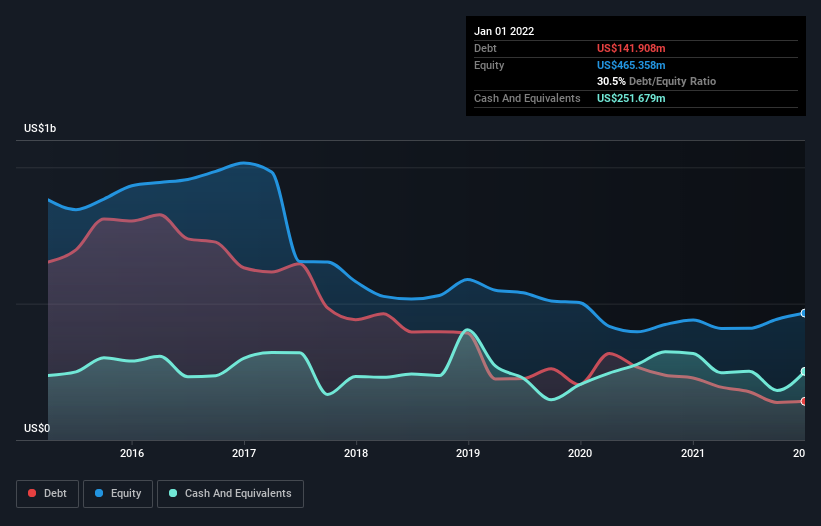Here's Why Fossil Group (NASDAQ:FOSL) Has A Meaningful Debt Burden
Legendary fund manager Li Lu (who Charlie Munger backed) once said, 'The biggest investment risk is not the volatility of prices, but whether you will suffer a permanent loss of capital.' So it seems the smart money knows that debt - which is usually involved in bankruptcies - is a very important factor, when you assess how risky a company is. As with many other companies Fossil Group, Inc. (NASDAQ:FOSL) makes use of debt. But the more important question is: how much risk is that debt creating?
Why Does Debt Bring Risk?
Debt assists a business until the business has trouble paying it off, either with new capital or with free cash flow. Part and parcel of capitalism is the process of 'creative destruction' where failed businesses are mercilessly liquidated by their bankers. While that is not too common, we often do see indebted companies permanently diluting shareholders because lenders force them to raise capital at a distressed price. By replacing dilution, though, debt can be an extremely good tool for businesses that need capital to invest in growth at high rates of return. The first step when considering a company's debt levels is to consider its cash and debt together.
Check out our latest analysis for Fossil Group
How Much Debt Does Fossil Group Carry?
As you can see below, Fossil Group had US$141.9m of debt at January 2022, down from US$227.4m a year prior. However, it does have US$251.7m in cash offsetting this, leading to net cash of US$109.8m.
A Look At Fossil Group's Liabilities
Zooming in on the latest balance sheet data, we can see that Fossil Group had liabilities of US$535.6m due within 12 months and liabilities of US$367.7m due beyond that. On the other hand, it had cash of US$251.7m and US$318.2m worth of receivables due within a year. So its liabilities outweigh the sum of its cash and (near-term) receivables by US$333.5m.
This is a mountain of leverage relative to its market capitalization of US$532.9m. Should its lenders demand that it shore up the balance sheet, shareholders would likely face severe dilution. Despite its noteworthy liabilities, Fossil Group boasts net cash, so it's fair to say it does not have a heavy debt load!
We also note that Fossil Group improved its EBIT from a last year's loss to a positive US$124m. The balance sheet is clearly the area to focus on when you are analysing debt. But you can't view debt in total isolation; since Fossil Group will need earnings to service that debt. So if you're keen to discover more about its earnings, it might be worth checking out this graph of its long term earnings trend.
Finally, while the tax-man may adore accounting profits, lenders only accept cold hard cash. Fossil Group may have net cash on the balance sheet, but it is still interesting to look at how well the business converts its earnings before interest and tax (EBIT) to free cash flow, because that will influence both its need for, and its capacity to manage debt. Looking at the most recent year, Fossil Group recorded free cash flow of 37% of its EBIT, which is weaker than we'd expect. That weak cash conversion makes it more difficult to handle indebtedness.
Summing up
While Fossil Group does have more liabilities than liquid assets, it also has net cash of US$109.8m. So while Fossil Group does not have a great balance sheet, it's certainly not too bad. When analysing debt levels, the balance sheet is the obvious place to start. But ultimately, every company can contain risks that exist outside of the balance sheet. To that end, you should be aware of the 2 warning signs we've spotted with Fossil Group .
Of course, if you're the type of investor who prefers buying stocks without the burden of debt, then don't hesitate to discover our exclusive list of net cash growth stocks, today.
Have feedback on this article? Concerned about the content? Get in touch with us directly. Alternatively, email editorial-team (at) simplywallst.com.
This article by Simply Wall St is general in nature. We provide commentary based on historical data and analyst forecasts only using an unbiased methodology and our articles are not intended to be financial advice. It does not constitute a recommendation to buy or sell any stock, and does not take account of your objectives, or your financial situation. We aim to bring you long-term focused analysis driven by fundamental data. Note that our analysis may not factor in the latest price-sensitive company announcements or qualitative material. Simply Wall St has no position in any stocks mentioned.

 Yahoo Finance
Yahoo Finance 
